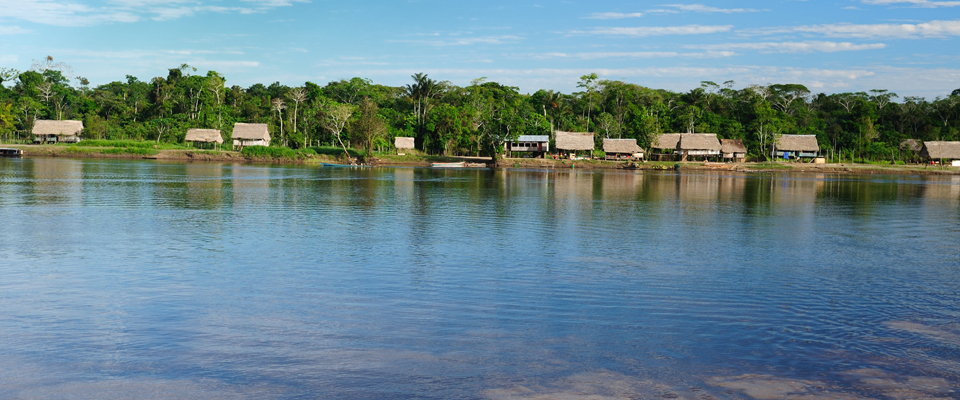
Sat around the pool last night for a chilled out chat with Walter, hotel proprietor and producer of nearly all the Werner Herzog films. We still seem to have the place pretty much to ourselves, but everything here is so unlike any ordinary hotel. For one, Walter is the 'customer', not we, meaning we remain here at his pleasure. We've not talked money yet and neither of us have any idea as to what the room rate is or what the total bill might add up to - we sleep and skinny dip, are told to help ourselves to drinks from the bar, watch old movies in a makeshift cinema, hand over our dirty laundry wrapped in a towel ... It's all so lovely and quaint and old-world.
We came to find out, during last night's conversation, that Mick Jagger had originally been cast to play the role of a retard in Fitzcarraldo. In fact, he did spend six weeks filming in Iquitos only for the lead role to be recast, and with too little time left to reshoot due to a Rolling Stones tour, abandoned ship. From Jagger our conversation moved to foreigners undertaking spiritual pilgrimages (each one crazier than the next), to shamans, ayahuasca, and to enemas - apparently THE thing to do while here - and finally the possibility of getting a tattoo done prior to our Tuesday departure. It's all part of the waiting game.
The abundance of time gives one cause to reflect. Despite the excitement of bobbing along the river in a few days' time (in truth we'll be rowing as if our life depended on it, seeing that we need to cover at least 80 miles a day, every day), I worry about what I know is to come. Forget the pirates: they are a possibility, albeit a strong one. Let's focus on the certainty, namely of ordinary guys stuck on a small vessel with no place to go, no privacy, and no possibility of respite. Anton and I get along so well, and there's so much that I admire in him, but I know we will grate on each other over the weeks to come; there will be quarrels and suspicions; there'll be petty annoyances. God, I hate the prospect of falling out - I so do - but we're human and humans do as humans are - not as they wish to be - and this is precisely what so much of my research is about. What is it, really, to be truly human in the context of others? What is it that makes for more and less effective coordination and collaboration? When stakes rise, and when things get truly difficult, do people become better or worse at coordinating? More clear-headed? Or more likely to fall into default patterns of behaviour? With what consequence?
Thinking back on my fieldwork with combat surgeons in Helmand in 2011, I remember being taken aback at the paralysing effects of boredom on teamwork. These surgeons were far more effective when faced with near-impossible workloads than they were in quiet periods. Lack of work should be a good thing in principle insofar it means no one is getting hurt. Yet the ensuing boredom can be destabilising. They begin to wish for new work to come in but feel guilty about this as it means people must get hurt in the process. They are at risk of over-operating - or of bringing people back into theatre when not strictly necessary - if only to have something to do, something to feel good about. They are more likely to become critical of each other's work. They are more likely to become reflexive and aware that much of what they do isn't as useful as one might like to think. They become existentially bored - not because there isn't anything to do but because there isn't anything worth doing.
For example, about half of the 170-plus casualties that are brought into the hospital each week are Afghans. They, by protocol, can be expected to be treated only up to the level equivalent to what a local hospital would provide (which isn't high), and only for so long as it is safe to feed them into a local healthcare system. For all practical purposes this means 72 hours or less, and an abrupt transition from powerful analgesics to household painkillers. I well remember Afghan patients being 'unplugged' of their antibiotics, oxygen and morphine prior to handing them over to a 'man with a van' for a four-mile trek to Camp Hero. The psychological effects of such 'pointlessness' are profound, as indeed they should be for any decent human being.
While the stakes are infinitely lower, we too will face long periods of boredom. The river is massive - it has the largest water-flow of any river anywhere in the world - and will soon tire of the wildlife on view. Our highlights will be the strong winds that can quickly whip up massive waves, the thrill of the unexpected, the sorts of difficulties that will force us to improvise, to protect and care for each other, and it is these moments in which we'll feel truly alive and aware as never before of what matters most and why.
Occasions like these, however, will likely be rare. The stressful bits will be the mundane and ordinary, and it has just struck me that it is these bits that I'm least looking forward to and yet most need in terms of research. One of the aims of this adventure is, after all, to generate new research questions on the nature of collaboration, and the worse things get, the more promising they may prove to be research-wise.
And so I find myself a subject in an experiment of my own making, knowing what is likely to happen and yet hoping it won't.
Then again, our experience may be different from the norm. After all, we're hardly Bear Grylls. We don't wear combat clothes (in fact most of the time we wear nothing at all); we don't know how to defend ourselves; we don't know how to make fire with sticks; can't stomach the thought of drinking urine or eating bugs; we speak no useful languages; we wouldn't know what plants to eat and what to leave well alone; and have no sense of geography (nor of much else for that matter). Nor do we have washboard stomachs - we don't exercise all that much and live off coffee and beer, presumably like many of you.
But then it wouldn't be interesting if it weren't for the ordinary.

















